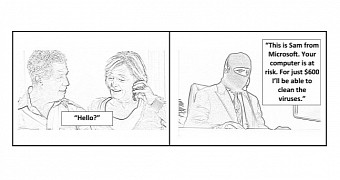Microsoft seems to have had enough of criminals abusing its name in one of the most common scam tactics used today, the tech support scam.
This nefarious tactics relies on cyber-criminals cold-calling users or scaring them with popups on Web pages, and scareware pushed to computers via various sorts of malware.
When users are contacted, Microsoft says that most of the time they pose as Microsoft employees or Microsoft partners, and try to extort their victims into loosening up their wallets and paying for so-called computer infections.
The tech support scam industry estimated at $1.5 billion
The company says that this tech support scam has become so rampant that it has received over 175,000 customer complaints since May 2014.
Only this year, Microsoft is estimating that over 3.3 million people will be swindled in the United States to pay more than $1.5 billion / € 1.34 billion to scammers.
The company has been on a crusade against these types of scammers since early 2014, when it started its first civil lawsuit against one of the scammers caught by authorities.
Its efforts have been driven by the fact that, besides using the names of various tech companies like Google, Facebook, or Apple, most of the time, scammers use Microsoft's name, so much so that this technique is slowly starting to be known as the "Microsoft Tech Support Scam."
Elderly people are the scammers' main targets
What's even more worrying is that, most of the times, scammers target elderly people. To raise awareness of this fraudulent practice among the population, on September 30, Microsoft held a discussion at its Redmond campus with over 300 members of the AARP (American Association of Retired Persons).
The discussion was hosted by Frank Abagnale, AARP’s Fraud Watch Network Ambassador and identity theft expert. You might know him from the Steven Spielberg's "Catch Me If You Can" movie, being played by Leonardo DiCaprio.
Some of the advice Microsoft is giving its users so they can stay safe includes:
| Never provide your credit card or financial information to someone claiming to be from Microsoft tech support. |
| Take the caller’s information down and immediately report it to your local authorities. |
| Never give control of your computer to a third party unless you can confirm that it is a legitimate representative of a computer support team with whom you are already a customer. |
| Ask if there is a fee or subscription associated with the "service." If there is, hang up. |
| Do not purchase any software or services. |

 14 DAY TRIAL //
14 DAY TRIAL // 